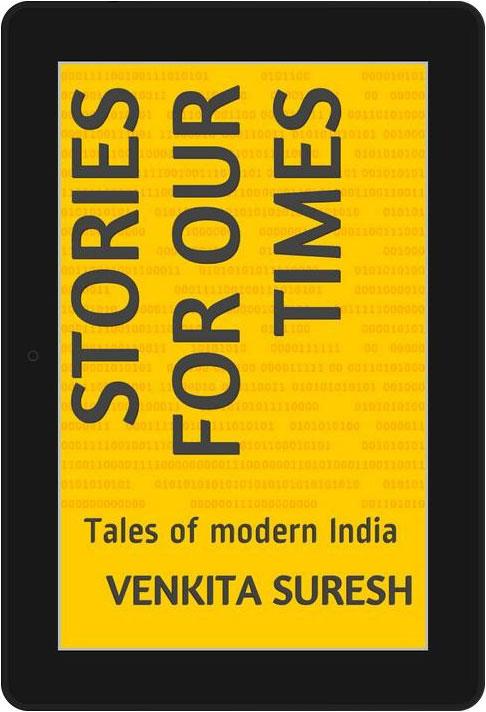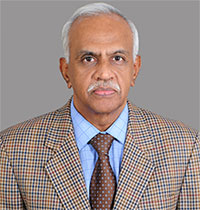Dr Suresh Venkita, our Group Medical Director, a senior cardiologist and an avid writer, has yet again shared this lovely story from his desk.
R and R

Ravinder was dead. He and Rajesh were together for a very long time; so close that it they were like peas of the same pod.
Ravinder loved life; he relished every moment of it. He worked incessantly, industriously and intelligently, to extend life. He was determined to ensure that such extension will not be vegetative but vibrant and productive. He certainly had the brains to make it possible. Immortality was his incandescent but implausible dream.
That made it all the more tragic that such a brilliant researcher like him had to die, in the prime of his life and career, abruptly and violently.
But most such dark events have their beginning way back in time, and develop inexorably to its full-fledged manifestation and impact.
It was like cancer, a subject they both worked on. They knew that cancer did not begin as a lump that appeared out of the blue one bad day. As chromosomes divided, faults in DNA occurred and accumulated. A switch tripped and an abnormal sequence of amino acids was created. That manufactured a defective protein which triggered the growth of a malignant cell line that evaded cellular and hormonal defence mechanisms and thus a cancer was born. It was premeditated, and wilfully executed, like a murder.
Their association had begun long ago in a nondescript village in a green and humid coastal state of south India where they were born, and grew up together.
Their landscape was a wet and glistening sheet of rice-paddy fields that stretched up to the horizon. Their houses were wooden and ancient, tucked away between tall banyan and mango trees and swaying coconut and betel palms.
The day began with a breathless run to the pond to dive in stark naked for a quick bath. There was always time for a quick swim, both above and under water. They raced to the other end and Ravinder always won by a head length. When they grew bigger and stronger they dived and swam across canals and rivers and again Ravinder reached the other bank first.
After the bath came the prayers. After prostrating before an array of colorful gods and goddesses, and a quick meal of rice (soaked overnight in water), yoghurt and pickle they would run bare feet to the vernacular village school, Ravinder a leg length ahead.
Both were bright and industrious but in every test, Ravinder was ahead by a few marks. When school was over they would run back home, and arrive breathlessly, Ravinder still a head ahead.
At football Ravinder was captain and Rajesh kept the goal. When they won the crowd cheered Ravinder; when they lost they booed Rajesh.
At school, plays were popular, and the children never tired of playing the ‘Inspector-Thief’ theme. Inevitably Ravinder got the role of the inspector brandishing his Khaki uniform and toy revolver and Rajesh was the furtive, ill -fated thief.
When they moved to the English High School for Boys in town, and when the amateur thespians graduated to staging Shakespeare, Ravinder got to dress up as Portia, brilliantly defending Rajesh’s Antonio and saving his pound of flesh from the mean Merchant of Venice, Shylock.
They did everything together. In childhood, it was all play. Now it was serious science.
Rajesh shared Ravinder’s fascination for life. They acquired an interest in insects, frogs and fish and other forms of life. They wandered around the village studying their biology. They observed tadpoles as they grew limbs, lost the tail and became a frog. They watched in fascination a larva becoming a pupa and then a beautiful butterfly. They followed fish eggs forming larvae and growing into schools of fish. It was wonderful, inspiring and hopeful see life forming and thriving.
But invariably, and inevitably, they also noticed that life often ended unexpectedly and violently. Life and death seemed to follow the same ground rules, and both could surprise you by its suddenness and finality.
Encouraged by their teachers they began presenting their research at science clubs, and later publishing, first in school magazines and then in national journals. Their projects and papers won prizes. Ravinder was always the acknowledged author and the one to receive the award. Rajesh stood in the wings, applauding heartily.
They grew into bright and brilliant young men and nothing could stop both from first qualifying for the prestigious Indian Institute of Science at Bengaluru and then go on to earning their admission to the Mecca of science, and the incubator of the intelligent, MIT at Cambridge, Massachusetts.
They researched tirelessly and published prolifically. The world’s best journals first accepted their papers and then began to invite them to patronize their journals to publish. Their citation index rose sky high.
Awards and gold medals followed one after the other, the authors were Ravinder and Rajesh, and always Ravinder was called to the dais and bathed in praise and glory. He was positioned for basking in the sunshine of publicity and projected into the glare of the media.
Rajesh stood in the shadow, always smiling, approving, appreciating and applauding.
Later their interest turned to brain tumors, and especially to Glioblastoma Multiforme (GBM), one of the most vicious among them.
GBM is one of the most aggressive primary cancers of the brain. Typically, treatment involves surgery, after which chemotherapy and radiation therapy are used. Despite maximum treatment, the cancer usually recurs. The most common length of survival following diagnosis was 12 to 15 months. Without treatment, survival was typically three months.
Ravinder and Rajesh began to work on ‘immunotherapy’, with promising results. They followed it up with ‘gene therapy’.
It was Rajesh who first thought of ‘R & R’, a combination drug involving a gene therapy agent and a prodrug.
When US Senator Ted Kennedy and later US Vice President Joe Biden’s son died of GBM and when Senator Jon McCain announced that he has been diagnosed with the disease and had begun latest modalities in treatment, worldwide interest in the disease sky-rocketed.
The latest modality of experimental treatment that was on offer was indeed ‘R & R’, and the inventors came in line for the most prestigious prize in cancer research.
The Medal of Honor, which is the American Cancer Society’s highest award, is presented to individuals who have made outstanding and valuable contributions in the categories of Cancer Control, Clinical Research and Basic Research.
For the first time in his life Rajesh wanted ‘R & R’ to be Rajesh and Ravinder.
They were together in the laboratory when the final draft of the paper was ready for submission to Nature, the world’s most prestigious research journal. Publication in Nature would be the most decisive factor towards selection for the great honor. Rajesh gulped and finally made the request he had carried in his mind ever since the seminal study began – he asked Ravinder to cite him as the first author.
Ravinder laughed.
It grew into peals of laughter, which escalated in volume like a thousand bells ringing in unison. They hammered into Rajesh’s eardrums.
Shock waves from that rose like a tsunami inside his head. Towering waves sloshed inside and slammed against its vault smashing and drowning the grey and white matter of his brain. It was the perfect storm.
Ravinder was still pouring over some papers as Rajesh left.
A call came from Ravinder, soon after he left. Rajesh did not take it. He was distracted.
There was one more call; He did not even bother to look at the phone.
Sometime later, there was a knock on his door.
A police officer and the Director of the Institute were at the door. The Director spoke.
‘We found Ravinder dead at his table at the lab, cold and blue’
Rajesh was silent. The director continued:
‘We called you, there was no response. You were the last to be with him’
Rajesh remained silent. The Director seemed puzzled, but rallied.
‘Oh, I almost forgot. On the top of his papers, we found a document signed by him, obviously his last act. It is for you’. He handed over that paper.
Rajesh looked down at the white paper handed to him. Ravinder had made him the first author of the paper on ‘Switching off the fault-sequence in the genome of Glioblastoma Multiforme’ and signed as the second author.
The inspector spoke ‘Can you come with us, and take a look? You might be able to tell us what went wrong’.
Rajesh’s vision darkened. His heart twisted. A great grief sank into the pit of his stomach. His body trembled and his legs turned rubbery.
His tongue felt thick and dry as he muttered ’I know what went wrong. He did not just die’.
‘How can you tell, you were not there?’ The Inspector spoke harshly.
Rajesh was almost inaudible as he spoke.
‘I wish I’d been there earlier. It might have made all the difference. So all I can tell you is why he was murdered’
He told them. He told them about how he closed all the windows, turned the Carbon Monoxide on, shut the door behind him and left Ravinder to slowly, unknowingly, die.
Then he walked up to his dressing table, opened the drawer, took out his pistol, put it deep into his mouth, directed up towards his palate and fired a single shot

Dr. Venkita S Suresh,
Group Medical Director and Dean of Studies,
DNB and other post-graduate training programs.

